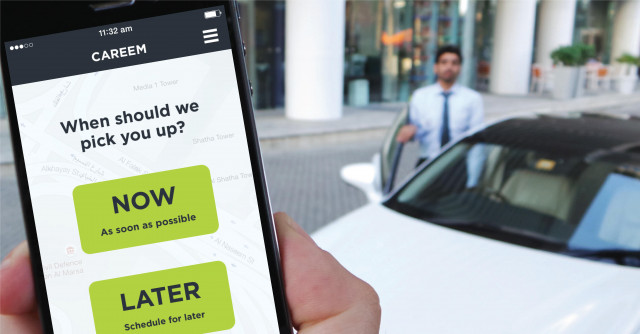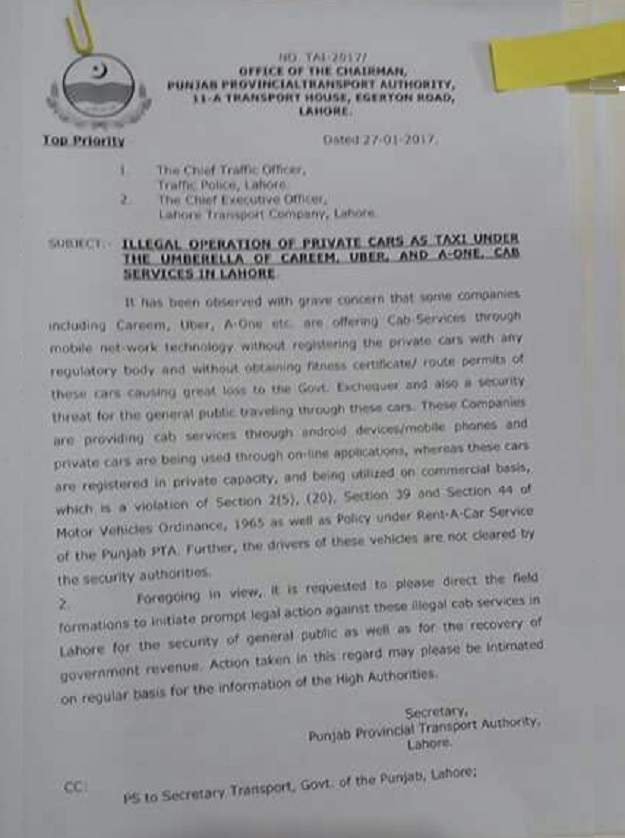Sindh, Punjab govts move to 'ban' Careem, Uber
App-based ride-hailing services could also face similar restrictions in Islamabad, sources say

Punjab and Sindh governments moved on Tuesday to regulate and 'ban' ride-hailing services Careem and Uber.
Pakistan was a relatively late entrant to the ride-hailing landscape – Dubai-headquartered Careem and Uber were both launched in the country last year.
Punjab Government’s Provincial Transport Authority declared Careem, Uber and other ride-hailing services operating in the province "illegal".
A notification in this regard was sent to Lahore’s chief Traffic Officer, and CEO of the Lahore Transport Company.
The notification said the two companies have been offering transport services "without registering private cars with any regulatory body."
Here's why people are deleting Uber from their smartphones
Since private cars, the memo added, are being used for transportation, and they must not be used for commercial purposes, such services are not only violating local laws but also pose a security threat for the public.

The government said the failure of Uber and Careem to obtain the required fitness certificate and route permits for their fleet of cars has resulted in "great loss to the government".
Uber under pressure in Pakistan as Careem speeds ahead
According to the notification, field traffic officers were directed to ensure prompt action is taken against "illegal services".
Sindh govt asks PTA to block Careem app
The Sindh government also sought legal action against the ride-hailing services.
The provincial government declared the use of private cars as taxis without mandatory legal permits as 'illegal', asking the Pakistan Telecommunications Authority (PTA) to block the apps.
Sindh Secretary Transport Tuaha Farooqui said there are three types of NOCs which the management of Careem and Uber were required to obtain.
"When private cars are used as commercial vehicles they have to pay Rs160 annually to the Excise and Taxation department. However, they are not required to change their number plates," Farooqui told The Express Tribune.
The secretary said the management of the two companies have to get themselves registered with the Regional Transport Authority (RTA) and also acquire a fitness certificate. Once these requirements are fulfilled, he said, the companies can operate without any hindrance.
Farooqui said his office wrote about 12 letters to Careem to comply with the legal issues. As for Uber, the secretary transport said their management committed to go through the legal processes; however, only eight of their vehicles were registered.
However, as of now, the ride-hailing services remain operational throughout the country.
Careem, Uber to face restrictions in Islamabad
Following Punjab and Sindh, authorities in the federal capital seemed all set to impose similar restrictions on app-based ride-hailing services.
Sources in the Islamabad Capital Territory Administration (ICTA) told The Express Tribune that a notification in this regard will be issued on Wednesday. “We are imposing the same [restrictions] and a notification will be issued in the [Wednesday] morning,” an ICTA official said.
An Islamabad Transport Authority official said they were looking into the matter, adding that the cab services might be restricted under the Motor Vehicle Ordinance since they are not meeting various requirements.
Careem responds
MD Careem Pakistan Junaid Iqbal responded to the ban imposed on Careem and Uber services.
“We are in talks with government institutions to understand where ride-hailing falls in terms of legal guidelines. We aim to work with the government of Pakistan to bring in 100,000 private cars in our service before the end of 2018. Ride-hailing is the new kind of technology and where its legal definition hasn’t yet been addressed,” said Iqbal in a live session on Facebook.
Citing examples of how the services have been adopted all over the world, Iqbal said, “Throughout the world, new regulations are being made to define ride-hailing services for example, in India, the parliament is currently discussing the legal ride-hailing guidelines while in Saudi Arabia all private cars are made public for Saudi nationals.”
Emphasising the role ride-hailing plays in the traffic dynamics of the city, Iqbal said, “In Karachi, whenever there is a road built, Traffic is disturbed. This is where ride-hailing can play an important role. People use their own car predominantly with one passenger. Careem helps with using one car for multiple people to reduce emissions. Hailing and sharing is an inclusive concept that Careem employs.”
Issue will be resolved soon: PITB chairman
Punjab Information Technology Board (PITB) chairman Dr Umar Saif said the provincial government was in talks with the app-based ride-hailing companies and hopeful that the issue will be resolved soon.
Working on the Uber and Careem issue. Better sense will prevail. Hold your judgements.
— Umar Saif (@umarsaif) January 31, 2017 ">Working on the Uber and Careem issue. Better sense will prevail. Hold your judgements.
— Umar Saif (@umarsaif) January 31, 2017
“We are the ones who brought Uber and Careem to Pakistan,” he said while talking to media. “Initially these ride-hailing services started on experimental basis, but now they have added 10,000-20,000 cars to their networks."
Uber launches rickshaw service in Pakistan
“Companies which don’t have their own assets but have a network, in case of these commuting services they have networks of drivers, on such companies network service tax is implied,” he said, adding that the government was formulating policies in consultation with all these new business models as all these emerging new business models require new regulatory and taxation regimes.



















COMMENTS
Comments are moderated and generally will be posted if they are on-topic and not abusive.
For more information, please see our Comments FAQ